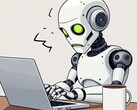Since ChatGPT was released in November 2022, there has been intense debate about whether artificial intelligence could threaten entire professions and lead to mass job losses. A new study from Yale University, published on October 1, 2025 by Martha Gimbel, Molly Kinder, Joshua Kendall and Maddie Lee, presents a different picture – at least for now. Despite the rapid spread of generative AI, the researchers have found no clear signs of widespread unemployment or major structural changes in the US job market so far.
Thirty-three months after ChatGPT’s launch, the researchers examined whether changes in the labor market are happening faster than during earlier technological shifts like the spread of personal computers or the internet. They compared current developments to three historical phases: the PC era (1984–1989), the internet boom (1996–2002) and a pre-AI control period (2016–2019). Their analysis was based on CPS data, AI exposure estimates from OpenAI and usage data from Anthropic.
Too early for clear conclusions
The results are sobering: although there are slight changes in the occupational mix, they remain within the range of historical fluctuations. Even in sectors with high AI exposure – such as information and finance – the researchers found no clear evidence of job losses directly caused by AI.
The study placed particular focus on young professionals. Among university graduates aged 20 to 24, researchers observed slightly more pronounced shifts in employment patterns, though the underlying causes remain unclear. Due to the small sample size and broader labor market dynamics, it is difficult to say whether AI is the main driver. The authors remain cautious in their conclusions and point out the study’s limitations: exposure data is based on theoretical models, while concrete usage data is still limited. They urge AI companies to provide more detailed and transparent information, including company-level data.
Impact will take time
Viewed in historical context, the study puts the current debate about AI-related job losses into perspective. Previous technological shifts – such as the advent of computers or the internet – usually took years or even decades to noticeably impact the labor market. According to the researchers, it is unrealistic to expect AI to bring about immediate change.
Reddit disagrees loudly
On Reddit, especially in a widely discussed thread on r/technology, users responded with skepticism. Many criticized the study as disconnected from reality, citing actual layoffs, increased pressure to perform and hiring freezes. The most frequently mentioned criticisms were the short 33-month observation period, the lack of representative usage data and a general distrust of academic studies.
















